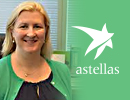You are now leaving XTANDI.com
The website you are about to visit is not owned or controlled by Astellas. Astellas are not responsible for the information or services on this site.

Astellas Executive Interview Series – Alison Hayles

What is your experience/background with oncology? Why did you decide to pursue this line of work?
I have been working on oncology drug development in a regulatory affairs role since 2007 and have been involved in a number of development programs in prostate cancer, AML, RCC, colorectal carcinoma, breast cancer, and glioblastoma.
Prior to this transition, I was in the United Kingdom working in the laboratory where I started to prepare the global regulatory dossiers to support market authorization, which included providing technical responses to health authority questions. When I moved to the United States in late 2001, I started a full regulatory role in the international division of another pharmaceutical company. In this position, I realized the role allowed me to see the broad spectrum of activities necessary for regulatory affairs and to become an integral member of the teams who are bringing new drugs to patients and improving patients’ lives in a meaningful way.
What drew you to the pharmaceutical industry and to Astellas specifically?
I joined Astellas in September 2008 because oncology was becoming a new focus for the company, and I thought that I could help to make a difference to the organization as it was growing, and to patients.
What project or activity has given you the greatest sense of pride, and why?
The in-licensing and successful partnership for the Xtandi project has brought me the greatest sense of pride to date. I was part of the in-licensing due diligence team and also the Global Regulatory lead for Astellas from the start of the partnership through the first approval in the United States in 2012. Enzalutamide clinical development was accelerated from first-in-man in 2007 to approval in the United States in August 2012, following a rapid review by FDA (101 days), which was a great success.
How does your team collaborate with other M&D functions to advance the M&D strategy?
Collaboration is critical for the regulatory team across the M&D organization since we are the key point of contact for the submissions to health authorities like the FDA, EMA and PMDA. We are not the owners of the data, but we play an integral role in creating alignment and developing an appropriate regulatory strategy to address concerns from regulatory authorities. We also must have a broad perspective on all aspects of the development plan, including providing support for post-approval activities.
 |
Get only the email alerts you want.
For media inquiries and reporter requests, please email us at corporate.communications@us.astellas.com.
Our communications team will respond to verified media requests within 24-48 hours as appropriate.
If you are not a reporter and need assistance, please visit our contact us page that includes information for patients, healthcare providers and researchers.
This website is intended for U.S. residents only. This website contains information about products that may not be available in all countries, or may be available under different trademarks, for different indications, or in different dosages. Nothing contained herein should be considered a solicitation, promotion or advertisement for any drug including those under development. Any information on the products contained herein is not intended to provide medical advice nor should be used as a substitute for the advice provided by your physician or other healthcare provider.
The site uses cookies to provide you with a more responsive and personalized service and to analyze site traffic. By using this site, you accept our use of cookies as described in our privacy policy. Please read our privacy policy for more information on the cookies we use, the processing of your personal data and how to delete or block the use of cookies.